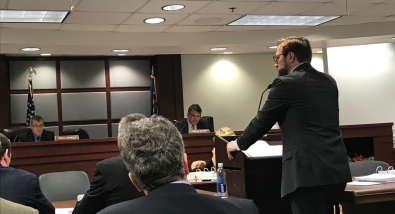Public Service Commission stiffs Georgia Power customers, greenlights Plant Vogtle cost increases
Despite mounting evidence that Plant Vogtle is uneconomic at its current price tag, the Georgia Public Service Commission today rubberstamped continued construction.
Commission staff had recommended the commissioners reject any price above $9 billion, beyond which customers will not benefit. Instead, commissioners approved Georgia Power’s full revised cost estimate, minus money already received from the bankrupt contractor’s parent company, Toshiba. Importantly, customers would benefit from this Toshiba money whether or not the project goes forward. This newly approved price tag is approximately $1.5 billion more than staff’s break-even point.

Worse, the PSC, in a move prodded by Georgia Power, said these additional costs are “reasonable.” That means customers will most likely shoulder the entire burden of risk for this over-budget, off-schedule mega project. Already, Plant Vogtle is five years behind schedule and double the original price tag.
“Most people have to pay for their mistakes, but Georgia Power is still profiting from theirs,” said Senior Attorney Kurt Ebersbach. “There’s something wrong with a system that rewards this kind of failure.”
The PSC’s vote protects Georgia Power’s shareholders instead of customers, even with its timing. The commission wasn’t scheduled to rule on the cost overruns and schedule delays until February but pushed decision-making up by 47 days.
Project delays alone will add billions more to the company’s profit. Putting a dent in shareholders’ returns doesn’t lower the final construction bill that will be handed to customers. Additionally, residential customers will be paying for Vogtle for 10 years before the nuclear units ever produce energy—and will continue to pay higher bills for decades.
During proceedings on the rate case, SELC represented Partnership for Southern Equity and Georgia Interfaith Power & Light in petitioning for decisions that prioritize customers over shareholders.
“Even though customers had no control over Georgia Power’s mistakes, they’re going to be the ones footing the bill,” said Nathaniel Smith, Chief Equity Officer at Partnership for Southern Equity. “These impacts will be especially difficult on the most vulnerable Georgians who are already struggling to put food on the table.”
“This holiday season the Georgia Public Service Commission gave Georgia Power a gift we can’t afford,” said the Rev. Kate McGregor Mosley, Executive Director of Georgia Interfaith Power & Light. “We’re disappointed the Commissioners didn’t consider other more economic alternatives, including solar and energy efficiency projects that provide clean power for less.”
